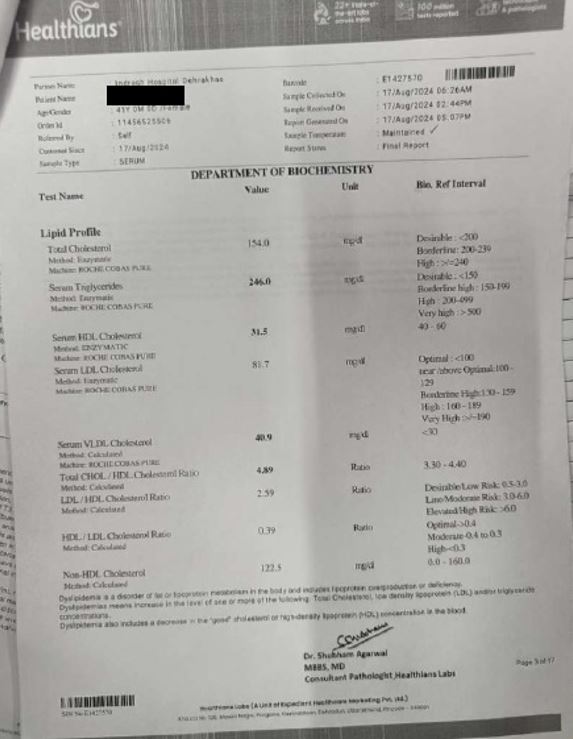A Case Study on Role of Virechana Karma as a conservative management in Metabolic Syndrome (Santarpana Janya Vyadhi)
DOI:
https://doi.org/10.21760/jaims.10.2.54Keywords:
Virechana Karma, Santarpanajanya Vyadhi, Metabolic syndromeAbstract
The prevalence of lifestyle diseases such as hypertension, diabetes mellitus, dyslipidemia, and obesity has skyrocketed in recent years. Among these, Metabolic Syndrome (MS) stands out as a significant public health challenge worldwide, fueled by the rise in obesity and sedentary living habits. This complex condition is characterized by a cluster of interrelated health issues, including abdominal obesity, insulin resistance, hypertension, and hyperlipidemia, all of which significantly increase the risk of cardiovascular diseases and other chronic illnesses. As there is no direct reference of Metabolic Syndrome in Ayurveda. But due to resemblance of its etiopathogenesis and clinical features, it may come under broad umbrella of Santarpanjanyavyadhi, Medopradoshaja Vikara and Medosroto Dusti. Virechana Karma is line of treatment for Santarpanajanya Vyadhi and Bahudoshawastha. The aim of this study was to treat Metabolic Syndrome with Virechana Karma. Weight, Waist circumference, Lipid profile was opted for the assessment of Metabolic Syndrome before and after the treatment. This case study involved a 41-year-old female patient presenting with weight gain, drowsiness, bodily heaviness, disturbed thyroid profile, and hyperacidity in the last four years. Initial assessments revealed elevated levels of total cholesterol, VLDL, and triglycerides. After undergoing Virechana Karma (therapeutic purgation), the patient demonstrated significant improvements in lipid profiles, complete remission of symptoms, and a remarkable weight loss of 4 kg. The impressive outcomes can be attributed to the correction of Agni (digestive fire) through Virechana Karma and the elimination of abnormal lipids from the body. This study strongly supports the efficacy and safety of Virechana Karma in the management of metabolic syndrome.
Downloads
References
Kaur J. A comprehensive review on metabolic syndrome. Cardiol Res Pract. 2014;2014:943162. doi: 10.1155/2014/943162. Epub 2014 Mar 11. Retraction in: Cardiol Res Pract. 2019 Jan 31;2019:4301528. doi: 10.1155/2019/4301528. PMID: 24711954; PMCID: PMC3966331.
Lipsy RJ. The National Cholesterol Education Program Adult Treatment Panel III guidelines. J Manag Care Pharm. 2003 Jan-Feb;9(1 Suppl):2-5. doi: 10.18553/jmcp.2003.9.s1.2. PMID: 14613351; PMCID: PMC10437161.
Khan Y, Lalchandani A, Gupta AC, Khadanga S, Kumar S. Prevalence of metabolic syndrome crossing 40% in Northern India: Time to act fast before it runs out of proportions. J Family Med Prim Care. 2018 Jan-Feb;7(1):118-123. doi: 10.4103/jfmpc.jfmpc_10_17. PMID: 29915744; PMCID: PMC5958552.
Longo DL, Fauci AS, Kasper DL, Hauser SL, Jameson JL, Loscalzo J, editors. Harrison’s Principles of Internal Medicine. 18th ed. New York: McGraw-Hill Companies, Inc.; 2012. p. 1992.
Bloomgarden ZT. Obesity, hypertension, and insulin resistance. Diabetes Care. 2002;25(11):2088-97.
Kashinatha Shastri P, Chaturvedi GN. Charaka Samhita of Agnivesh with Vidyotini Hindi commentary. Vol. 2. Varanasi: Chaukhamba Bharti Academy; 2013. Sutra Sthana 23, verses 3-4. p. 436.
Agnivesha. Charaka Samhita - Vidhyotani Teka, edited by Kasinath Sastri & Gorakhanatha Chaturvedi. Varanasi: Chaukhamba Bharti Academy; 2009. Charaka Sutra 23/8.
Lipsy RJ. The National Cholesterol Education Program Adult Treatment Panel III guidelines. J Manag Care Pharm. 2003 Jan-Feb;9(1 Suppl):2-5. doi: 10.18553/jmcp.2003.9.s1.2. PMID: 14613351; PMCID: PMC10437161.
Sastri K. Virechana Karma. In: Charaka Samhita. Varanasi: Chaukhamba Publication; Reprint 2011. p. 296.
Sastri K. Virechana Karma. In: Charaka Samhita. Varanasi: Chaukhamba Publication; Reprint 2011. p. 296.















